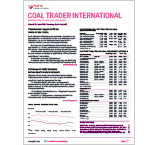begin quote from:
Japan, South Korea to have colder weather over Jan: weather ...
Platts-Dec 28, 2017
Most parts of Japan and South Korea
are forecast to experience lower-than-average temperatures at the start
of 2018 as peak winter season approaches, the two countries' ... Colder
weather is most likely in the southern parts of Japan, with Kyushu, Chugoku and Shikoku experiencing a 50% probability of ...
BY CONTINUING TO USE THIS SITE, YOU ARE AGREEING TO OUR USE OF COOKIES. REVIEW OUR
PRIVACY & COOKIE NOTICE
X
Japan, South Korea to have colder weather over Jan: weather agencies
Singapore (Platts)--28 Dec 2017 710 am EST/1210 GMT
Most parts of Japan and South Korea are forecast to experience lower-than-average temperatures at the start of 2018 as peak winter season approaches, the two countries' meteorological agencies said Thursday.
LNG industry insiders have commented that colder-than-expected temperatures have boosted spot LNG demand across north Asia in the last two weeks, with increased procurement activity observed from Japanese utilities at the end of the month.
The Platts JKM for cargoes to be delivered in February was assessed at $11.20/MMBtu Thursday, the highest price since November 10, 2014.
The central and southern regions of the country are forecast to experience below-average temperatures in the week of December 30-January 5, according to the weekly forecast from the Japan Meteorological Agency.
Article continues below...
| Request a free trial of: Coal Trader International |  | ||
Business
executives, traders, risk managers and other mining and energy
professionals can be more profitable and stay ahead of the competition
by getting the full story and the latest prices from Platts Coal Trader
International. Request a FREE trial to see how Platts Coal Trader
International can meet your needs.
| |||
Colder weather is most likely in the southern parts of Japan, with Kyushu, Chugoku and Shikoku experiencing a 50% probability of lower-than-average temperatures over the same period.
Temperatures were also forecast to be average or below-average across the country for the rest of January, the agency said.
Meanwhile, the Korean Meteorological Administration forecast below-normal or normal temperatures over January 8-14, but normal or above-normal temperatures from January 15 through January 21.
This could be followed by two weeks of below-normal or normal temperatures.
The forecast covers all areas of South Korea except Jeju-do.
Japan and South Korea are in the midst of the winter season when heating demand peaks. The weather has significant impact on their consumption of LNG, coal, crude oil, fuel oil and LPG, which are used for thermal power generation.
--Kenneth Foo, kenneth.foo@spglobal.com
--Edited by Jonathan Dart, jonathan.dart@spglobal.com


No comments:
Post a Comment